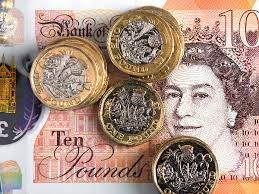The pound eased against the dollar on Thursday ahead of finance minister Jeremy Hunt’s new budget full of “tough but necessary” measures to control inflation.
Hunt, who took over from Kwasi Kwarteng who served as chancellor under former Prime Minister Liz Truss, plans to tackle a 55 billion-pound ($65.7 billion) hole in Britain’s budget by freezing thresholds and allowances on income tax, national insurance, inheritance tax and pensions for a further two years.
Inflation in the UK shot up at a rate of 11.1 per cent in the year to October, the fastest increase since October 1981 and well above September’s 10.1 per cent rate.
The expectation in the market is for Hunt to announce somewhere in the region of 40 to 50 billion pounds of total fiscal tightening over the coming couple of years.
“If that’s what we get, the market reaction should be fairly neutral.
“The risk to that view, I suppose, is that we get that magnitude of fiscal tightening, but more of it comes earlier,” RBC chief currency strategist Adam Cole said.
The question sterling traders will have to weigh up is whether tighter fiscal policy will return some credibility to UK markets, which should boost the pound, or whether a higher tax burden will hamper growth even further, thereby denting the currency, Cole said.
“For choice, I think it’s something which is probably something that is easier to play in gilts than it is in the currency.
“But if I had to jump one way or the other, I would say that tighter fiscal policy is more likely to play out as a fairly conventional cyclical story of ‘weaker growth, lower rates, weaker currency’,” he said.
Sterling was last down 0.3 per cent against the dollar at 1.188 dollars, having touched a session high of 1.1958 dollars earlier in the day, and was flat against the euro at 87.22 pence.
The pound hit a record low against the dollar of 1.0327 dollars in late September after Truss’ “mini-budget” added billions to the government’s borrowing costs and forced the Bank of England to step in to stabilise the market and protect pension funds.
Sterling has since regained around 16 per cent in value and is trading around its highest in three months. But much of this apparent strength has been the result of investors cashing in on the dollar’s huge rally this year.
Against the euro, the sterling has only risen by around 6 per cent since late September and by 9 per cent against the yen.
Gilt yields, meanwhile, have subsided. Benchmark 10-year gilts are around 3.3 per cent, their lowest since mid-September, just before Truss and Kwarteng released their budget.
Typically, this would have dragged on the pound, given the lower yield advantage it affords investments in sterling.
But the decline in yields mainly reflects a greater degree of confidence among investors, which has supported the currency.
Adding an extra element of risk on Thursday, are the economic forecasts of the independent Office for Budget Responsibility, which did not release any kind of breakdown of the impact of Truss’ budget in September.
“While a lot of what is to come today is likely to depend on what the OBR’s economic forecasts say it should also be noted that the OBR’s recent forecasts have been about as much use as a chocolate fireguard,” CMC Markets chief markets strategist Michael Hewson said.
“There are simply too many variables for any forecasts to be remotely accurate, and while economists have many varying models, they are only as good as the data that gets put into them,” he said. (Reuters/NAN)


